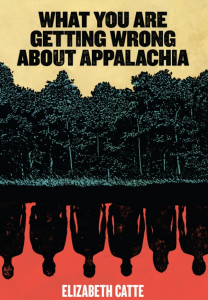The Appalachian region, defined by the Appalachian Regional Commission, includes 420 counties in 13 states in the United States. All of West Virginia, parts of Kentucky, and parts of Ohio are considered Appalachian.
The story of an Appalachian family was told by J.D. Vance in his 2017 book, Hillbilly Elegy: A Memoir Of A Family And Culture In Crisis. It will soon become a Ron Howard Hollywood movie.
Many rural readers took offense to Vance’s stereotypical representation. As did Elizabeth Catte—so much that she responded with her own book, What You Are Getting Wrong About Appalachia (Belt Publishing, 2018, 132 pages).

Elizabeth Catte is a writer and historian from East Tennessee. She holds a Ph.D. in public history from Middle Tennessee State University. She is the co-owner of Passel, a historical consulting and development company.
Catte digs into the “Trump Country” hyperbole in her book. The “Trump Country” slogan denies the reality that Bernie Sanders also won large parts of Appalachia. Catte questions the plethora of articles that appeared about Appalachia and Donald Trump during the 2016 presidential election.
In a 2018 author interview on NPR’s All Things Considered, Catte was asked a question about how she would like Appalachia to be viewed. She replied, “Something very ordinary. I think the problem that we’re starting to see from “Hillbilly Elegy” – and it’s certainly not a new problem in Appalachia. It tends to come in waves. There’s an idea that Appalachia is not fundamentally part of the United States, that it’s a place within a place, and it’s not a place but a problem. I would like people to understand that Appalachia is very much part of the wider United States. There’s no mysterious culture here that explains the – you know, the realities. And our stories – the story of Appalachia cannot be separated from the story of the United States and the historical forces that have shaped us.”
Catte traces an alternate history of Appalachia, one of resistance and exploitation that has been ignored by those outside of the region. She explores the economics of coal country from the 1920s to 1960s. With a mixture of history, analysis, and commentary, Catte gives voice to the culture, diversity, and beauty of Appalachia.
“False notions of Appalachia pick up a lot of baggage about class, but also about race. And what we see in these notions is that the experience of poverty is deeply racialized, even when the subject is presumed to be a white demographic. This is why, for example, when the National Review starts writing about Appalachia in 2014, they come out of the gate with an article called “The White Ghetto.” For those who like to indulge in that brand of self-righteousness, it is always the poor who fail our country, never a country that has failed the poor, and race and class work together in that regard to make poverty seem innate among certain populations,” stated Catte in an interview for Guernica, a non-profit magazine.
Catte blew some Appalachian readers right out of the Ohio River — that’s how much the content of her book was venerated. If you felt compelled to read Hillbilly Elegy, do yourself a favor and read Elizabeth Catte’s book, What You Are Getting Wrong About Appalachia.
I applaud Elizabeth Catte for standing up for Appalachian folks and facing the one-sided depiction by J.D. Vance.
Melissa Martin, Ph.D., is an author, columnist, and educator. She lives in Southern Ohio.
















